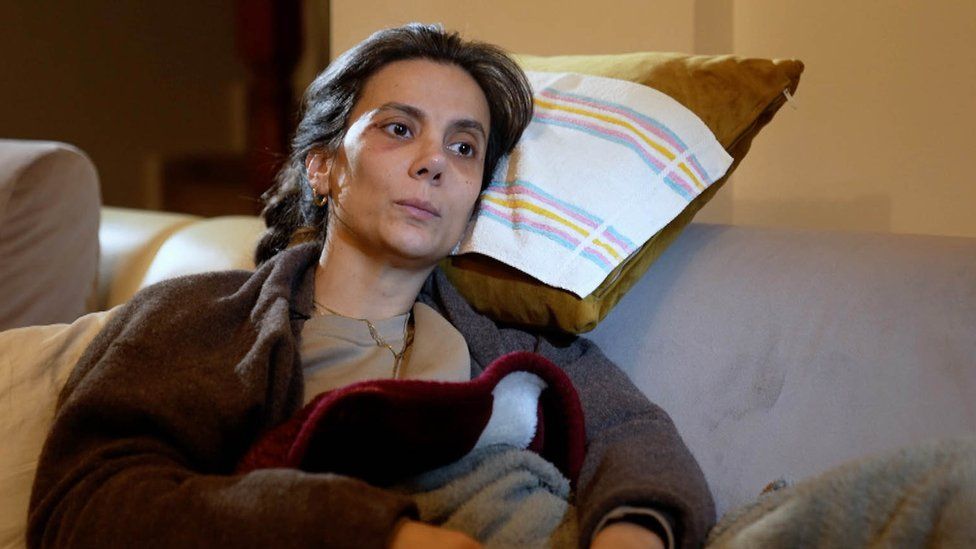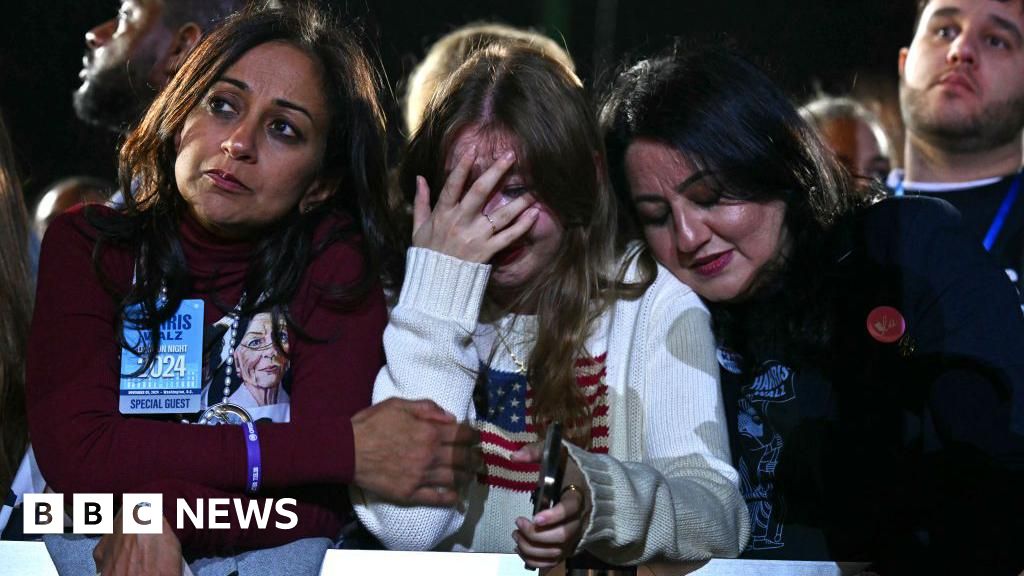ARTICLE AD BOX

Dilek Eger witnessed the death of her parents and brother in their family home in Iskenderun
By Selin Girit
BBC News, Turkey
The death toll from the devastating earthquakes that recently struck Turkey and Syria has climbed beyond 50,000 - and left many more people homeless. It has taken a terrible toll on mental health for those caught up in the tragedy, both directly and indirectly. The BBC has spoken with survivors, search and rescue teams, and experts.
It was past midnight when we arrived in Antakya, walking through darkness in a city left completely in ruins.
Our car had broken down and the replacement driver refused to take us to the city centre.
It was the third day after the earthquakes hit south-east Turkey. Our team had come from Maras, the epicentre of the quakes. Already thousands of people were confirmed dead and that number has continued to rise ever since.
As we advanced down the main road into Antakya, the constant siren of ambulances echoed through the rubble. Aid trucks, bulldozers and volunteers were all stuck in queues of traffic that stretched for miles. It was a state of utter chaos in the freezing cold.
Burak Galip Akkurt and his team from Turkey's voluntary rescue association, Akut, were working on a four-storey building. They suspected there were 10 people alive under the rubble, five of them children.
Burak Galip Akkurt and his rescue team listen for the tiniest sounds coming from under the rubble
Their torches pierced the darkness of the wreckage as they shouted the question that has become so familiar it cuts through Turkey like a knife: "Can anyone hear me?"
They waited in complete silence, hoping for the faintest voice to call back or even to hear the sound of a simple movement, a tap of a finger, a click.
"When you hear a voice coming from under the rubble, how does that make you feel?" I asked Burak in a quiet moment.
He needed to be detached from his feelings in order to carry on with the rescuing effort, he explained, but it would hit him once the mission was over and he would seek psychological help to cope with everything he had witnessed.
"It is not very easy to recover from the things you have seen. It is traumatic, and very dramatic as well."
No-one survived from under the rubble of the apartment block they were working on that night.
The next day I met Dilek Eger. She was rescued from a building in the neighbouring town of Iskenderun, after being trapped for eight hours.
"The tremor was incredibly strong. I immediately got up from bed and ran to my parents' room. I was screaming my lungs out. But my mother, father, brother, they were all silent. I thought I was going to lose my mind," she told me.
Image source, Reuters
Image caption,Homes were devastated in the port city of Iskenderun in Turkey's Hatay province
Dilek's parents and brother lost their lives under the rubble. She was stuck, surrounded by broken glass, with only the top of her head showing. A family friend was able to recognise and rescue her with his bare hands and a knife.
She couldn't cry at all for the first two days, but as she lay on the sofa in her grandmother's living room, talking me softly through her ordeal, she visibly started to go through all the emotions.
As she kissed and caressed a photograph of her mother and herself hugging, she began sobbing.
"My mother gave her last breath in my arms," she said. "Even when dying, she saved me, as she was on top of me. I couldn't do anything for her.
"My brother was stuck in the other room, and my dad was suffering in pain. This is when the whole world collapses. You are witnessing the death of everyone you love. I don't feel anger or revenge. I just feel so empty."
Dilek is one of tens of thousands of people to have survived the earthquake, but she now faces a life that may be scarred forever.
This week I received a text message from another survivor. He wrote: "Those of us who are now alive will stay under the rubble until the day we die."
Psychologists say the survivors of such a traumatic event will be going through phases: the initial shock, anxiety and fear will soon be replaced by a state of denial.
Image source, EPA-EFE/REX/Shutterstock
Image caption,Survivors of the earthquakes are trying to cope with trauma on a mass scale
Cagay Duru from the Turkish Psychologists Association said it was not easy to cope with a trauma on this scale, but talking about it, expressing feelings and thoughts about what has been experienced should be the first step towards healing.
He warned that if psycho-social support was not in place for those in need during this grief process, then many people could end up with serious disorders such as post-traumatic stress disorder (PTSD), depression or substance abuse.
"We all have to ask each other: How are you? Is there anything I can do for you?
"We have to say: I am here for you. We must give the message that we are in solidarity with those in need and we are trying to understand their experience, we are there to listen to them, help them and share all these emotions."
Normality would not mean returning to how life was before the earthquake, it would be a new normal, he warned. That new normal would need to be built up and it would take time.
But the difficulty of that task was underlined when a new set of earthquakes hit the already devastated town of Hatay.
These were not as strong as the initial two, but still panic-stricken people were on the streets, crying in despair, wondering whether they were facing a nightmare without end. Some were furious, asking what more could have been done to save lives.
Now in Istanbul, I have left the disaster zone, but I am still surrounded by trauma; glued to my TV screen and mobile phone like millions of others.
As Turkey's biggest city lies on a major fault line, people here cannot help but ask: Will they be going through the same tragedy in the future? What can they do to prevent it?
As grief sets in, mass trauma and how to respond to it has become another of Turkey's big challenges.

 1 year ago
23
1 year ago
23








 English (US)
English (US)